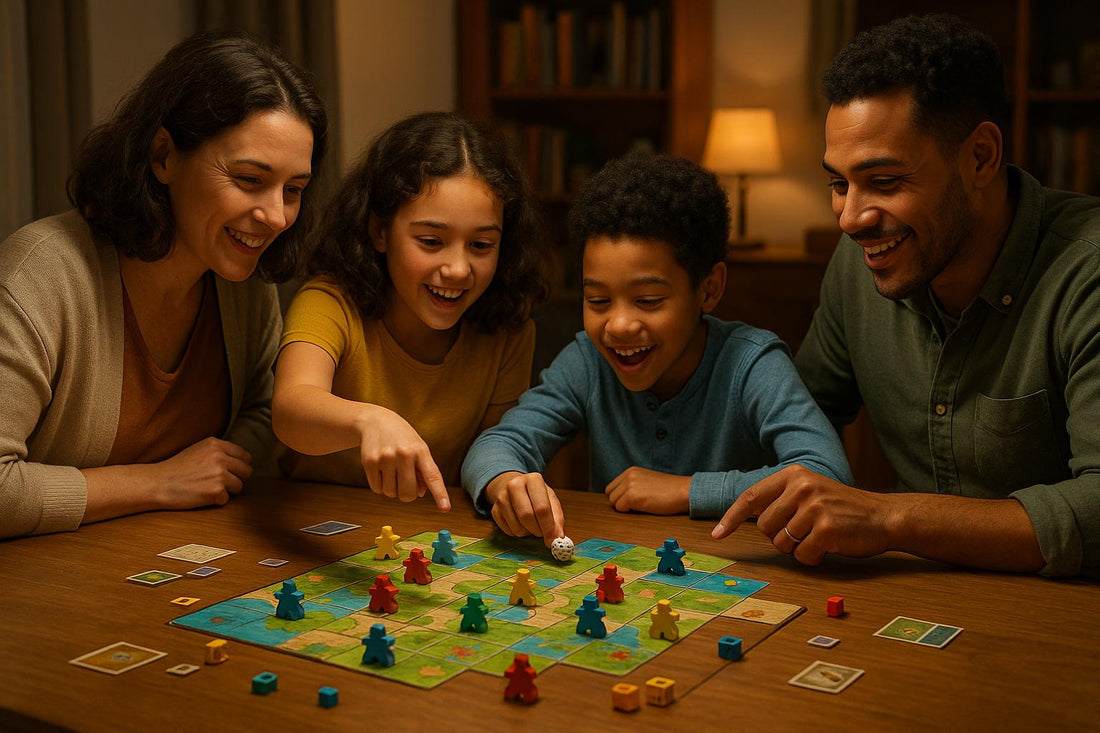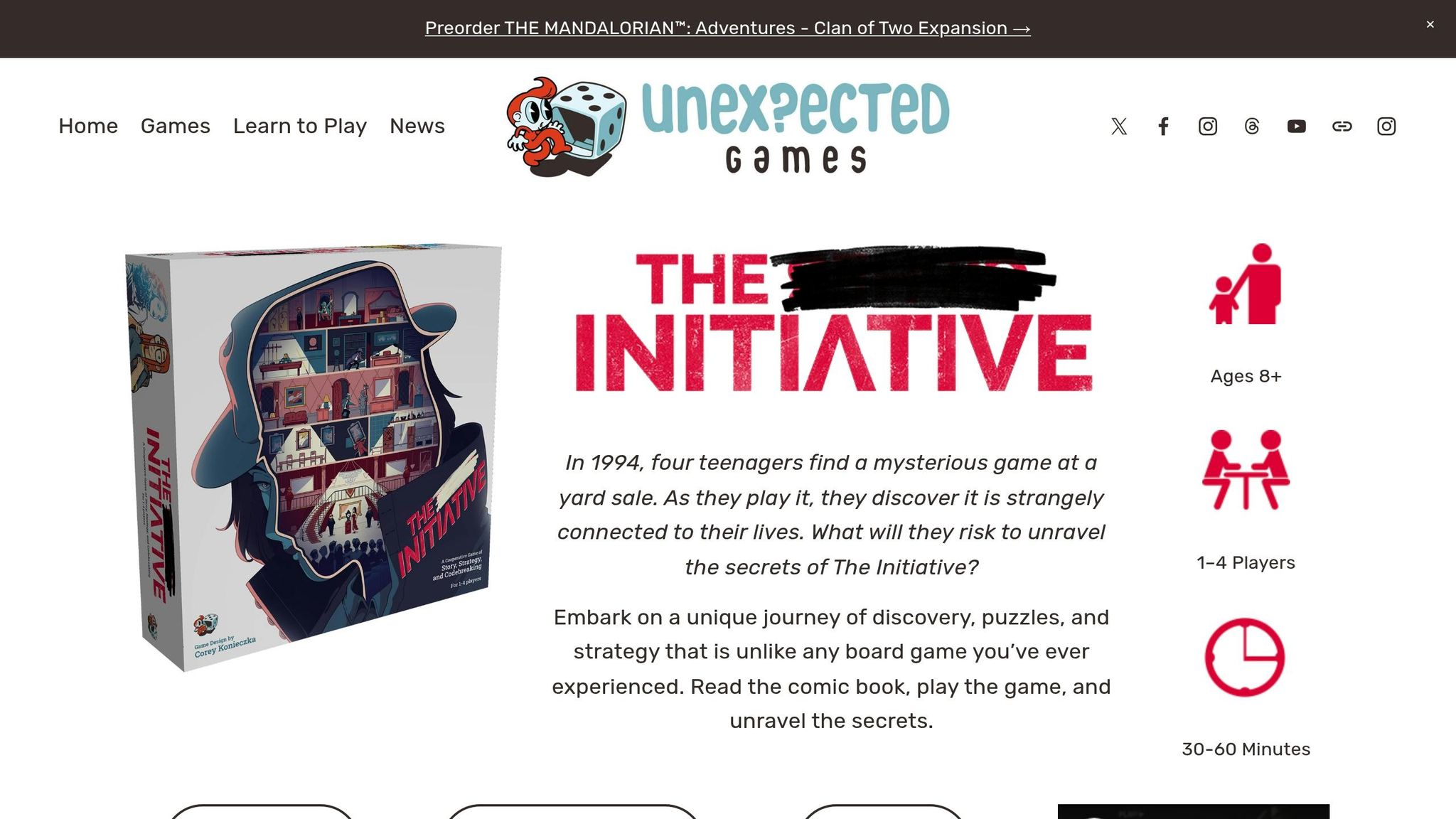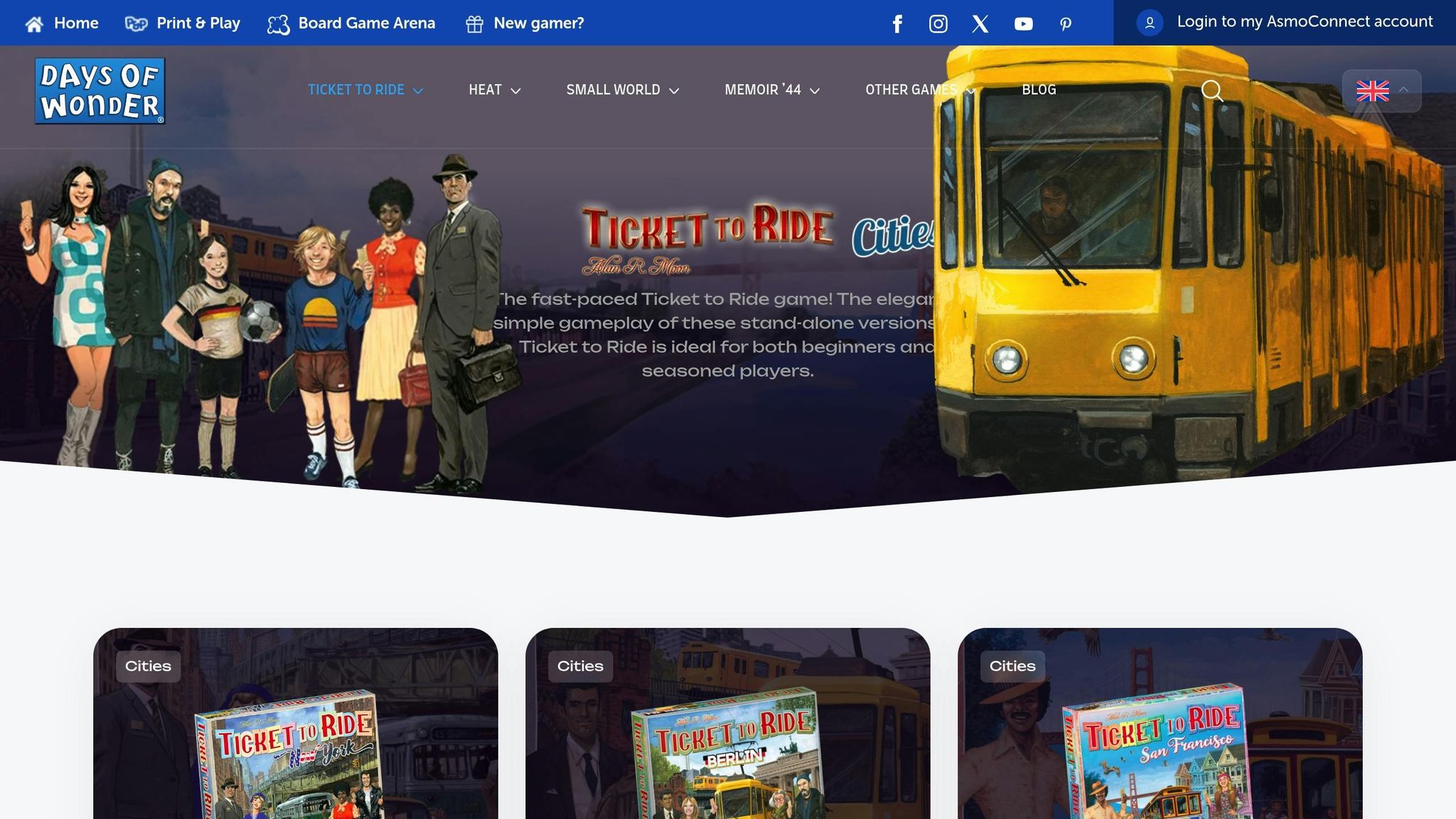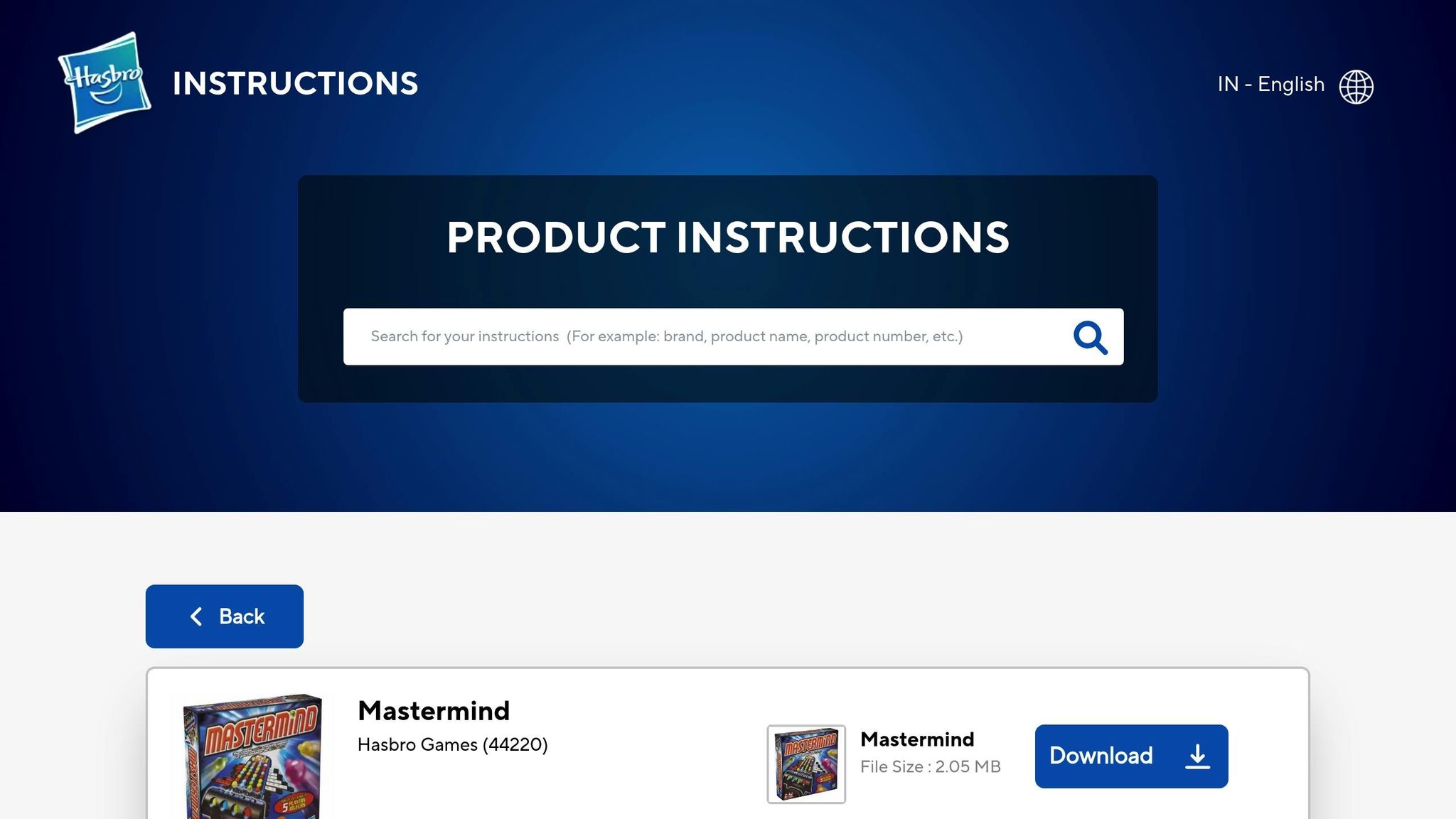Discover the Best Board Games for Every Player

Best Family Games for Critical Thinking
Want games that mix fun and skill growth for your family? Games that push for good thinking are key for better problem-solving, chatting, and making choices - all while making great memories. With teamwork tasks to plan-heavy games, there's a game out there for all, no matter how old.
Best Picks for Family Thinking Games:
-
Team Games: Join forces to unravel secrets or face challenges.
- Outfoxed!: Work as detectives to solve a mystery.
- The Initiative: A game full of puzzles for teens and grown-ups.
- Hoot Owl Hoot!: Get owls home safe (top pick for little ones).
-
Logic & Plan Games: Grow skills in making plans and choices.
- Ticket to Ride: Map out train tracks and manage tools.
- Othello: A two-player game using patterns.
- Mastermind: Guess secret codes through smart thinking.
-
Creative Fixing Games: Push new ideas.
- Snake Oil: Come up with and sell odd items.
- Eye to Eye: Link up images that look unrelated.
- Qwirkle: Lay tiles by color and shape to grab points.
Why Play These Games:
- Skill Growth: Boosts mind power like memory, sharp focus, and clear thinking.
- Teamwork: Pushes working together and talking well.
- Changing Ways: Teaches how to stay strong and think on your feet.
- Family Time: Makes family ties stronger by playing together.
To make game nights pop, pick games right for all ages, change how hard they are for all, and talk about moves after playing. These games are fun and also teach kids and grown-ups needed skills for daily life.
Brain Benefits of Playing Games with Your Family
Top Cooperative Games for Team Problem-Solving
Cooperative games bring a refreshing twist to playtime by encouraging everyone to work toward a common goal. Instead of competing against each other, families come together to tackle challenges as a team. This kind of play not only strengthens communication but also sharpens critical thinking skills. As Erin Vollmer, MS, CCC-SLP, a speech-language pathologist and co-founder of TherapyWorks, puts it:
"When kids play collaborative board games, they learn to share decision-making and creatively solve problems. They even have a positive impact on a child's self-esteem!"
These games create a relaxed environment where families can naturally develop essential life skills. They pave the way for shared victories and lasting family memories.
Outfoxed!
This mystery game transforms your family into a team of detectives on a mission to solve the case of a missing pie. Outfoxed! is all about teamwork, as players gather clues, eliminate suspects, and work together to identify the sly fox before it escapes.
Not only does this game encourage logical thinking, but it also promotes collaboration as families analyze clues and decide on the best course of action. It’s a fun way to practice deduction skills while enjoying quality time together.
The Initiative

For older players, The Initiative offers a thrilling mix of puzzles and storytelling. This codebreaking adventure challenges families to work through an evolving narrative, with each decision shaping the outcome.
The game’s strength lies in its intricate problem-solving tasks. Players decode messages, uncover secrets, and navigate a layered plot, all while honing skills like pattern recognition, logical deduction, and creative thinking. It’s a perfect choice for families looking for a more complex and engaging cooperative experience.
Hoot Owl Hoot!
Designed for younger children (ages 4–8), Hoot Owl Hoot! is a delightful introduction to cooperative gaming. This color-matching game has won the hearts of families everywhere.
The gameplay is simple and engaging: players work together to guide six colorful owls back to their nest before sunrise. It encourages teamwork and strategic thinking, and the difficulty can be adjusted by changing the number of owls in play, making it suitable for various skill levels.
The game also sparks natural discussion as players collaborate on the best strategies to help the owls. As Peaceable Kingdom, the game’s publisher, explains:
"In a cooperative game, players work together as a team, not against each other. Peaceable Kingdom's cooperative games build confidence, encourage inclusion, and teach kids to share."
This cooperative style helps children develop emotional intelligence and empathy, as they learn to support their teammates and handle any challenges calmly. With no individual winners or losers, the whole family celebrates together when the owls make it safely home.
Games That Build Logic and Planning Skills
While cooperative games focus on teamwork, strategy games push players to think independently, plan ahead, and adapt on the fly. These games challenge players to manage resources, predict outcomes, and adjust strategies based on ever-changing circumstances. As Potential Plus UK explains:
"planning, resource management, foresight, and adaptability."
This type of gameplay naturally strengthens executive function skills - the mental abilities that help us regulate thoughts and actions. These skills are essential for academic success and everyday problem-solving. Let’s take a closer look at how some popular games help refine logical thinking and strategic planning in unique ways.
Ticket to Ride

Ticket to Ride is a family-friendly strategy game where players collect colored train cards to claim railway routes, connecting cities and completing destination tickets.
What makes this game so engaging is its emphasis on resource management. Players must decide whether to draw more cards, claim a route, or pick new destination tickets - all while balancing short-term needs with long-term goals. Every decision has consequences, making each turn a lesson in planning and prioritization.
The game also introduces risk assessment. Should you aim for a long route that scores big but needs specific cards? Or play it safe with shorter connections? These decisions mimic real-life planning challenges, teaching skills that extend far beyond game night.
Othello

Also known as Reversi, Othello is a two-player game that combines simple rules with deep strategic complexity. Players place black and white discs on the board, flipping their opponent’s pieces by trapping them between their own.
Othello sharpens pattern recognition and consequence prediction. Each move reshapes the board, and players must anticipate how their placement will impact future opportunities. This constant mental mapping builds spatial reasoning and forward-thinking skills.
The game also teaches a valuable life lesson: early success doesn’t guarantee victory. A player who dominates early on may find their position completely reversed in the final moves. This highlights the importance of persistence and adaptability alongside initial planning.
Mastermind

Mastermind transforms logical deduction into an exciting puzzle. One player creates a secret code using colored pegs, while the other works to crack it through systematic reasoning within a set number of guesses.
This game is outstanding for developing analytical thinking. Players must use each guess strategically, gathering clues and narrowing possibilities. The feedback system - indicating correct colors in right or wrong positions - teaches kids to process multiple pieces of information and draw logical conclusions.
Ryan Billingsley, a teacher and chess coach, emphasizes the importance of such mental exercises:
"Children actually need to exercise their executive functions - the ability to control their own mind. They aren't born with the ability to masterfully resist their impulses and weigh the potential consequences of their actions. For that reason, learning logic through games is not only a lot of fun, it truly grows an incredibly useful skillset."
Making These Games Work for Your Family
To get the most out of these games, parents can model strategic thinking by explaining their decision-making process aloud. Share why you’re choosing certain moves or how you’re weighing different options. This helps younger players understand strategic thinking and apply it to their own gameplay.
For mixed-age groups, tweak the difficulty to keep everyone engaged. For example, give younger players extra destination cards in Ticket to Ride or an additional guess in Mastermind. These small adjustments ensure the learning stays fun for everyone.
Games That Encourage Inventive Problem-Solving
Inventive games take critical thinking to a new level by encouraging creativity and originality. Beyond logical planning and strategy, these games focus on creative problem-solving, pushing players to think beyond the usual boundaries and come up with fresh ideas. As Deanna Ritchie from Due.com puts it:
"Innovation games are potent tools to foster creative thinking and team synergy, all wrapped up in fun and excitement."
These games promote divergent thinking, where the goal isn’t about finding one "right" answer but exploring multiple possibilities. Here are some great examples that inspire players to tackle challenges in imaginative ways.
Snake Oil

Snake Oil turns players into inventive salespeople pitching quirky products to unusual customers. Each round, one player picks a customer card (like "Caveman" or "Vampire"), while the others combine two word cards to create zany inventions and deliver persuasive sales pitches.
This game is fantastic for building improvisation and persuasive communication. Players must quickly connect unrelated ideas into funny, yet convincing, products. For instance, a "Soap Ladder" might help pirates escape slippery situations, while "Chocolate Shoes" could fuel a marathon runner's sweet tooth mid-race.
What makes Snake Oil special is its emphasis on having fun with creativity. There are no wrong answers - just different levels of persuasion. This makes it an excellent tool for kids to take creative risks without fear of failure, while also improving storytelling and public speaking skills.
Eye to Eye
Eye to Eye challenges families to find surprising connections between unrelated images. Players compete to spot creative links, sharpening their ability to think associatively.
This game enhances associative thinking and mental flexibility. For instance, a clock and a pizza might connect through "circles", "numbers", or even "things that disappear fast." It encourages players to shift perspectives and consider multiple interpretations.
Eye to Eye is particularly great for families with players of different ages. Younger participants often outshine adults with their imaginative connections, proving that creativity isn’t tied to experience. This dynamic levels the playing field and celebrates diverse ways of thinking.
Qwirkle

Qwirkle combines pattern recognition with tile placement, challenging players to create lines of matching colors or shapes. Points are earned by expanding patterns, planning ahead, and blocking opponents.
The game stands out for its focus on spatial reasoning and adaptive strategy. The board evolves with every turn, requiring players to constantly reassess and find new ways to score. For example, a single tile placement might complete multiple lines, rewarding those who can visualize complex patterns.
Qwirkle mirrors real-life problem-solving by encouraging players to think flexibly. The ability to address multiple challenges with one clever move is a skill that extends well beyond the game table.
Fostering Creative Thinking at Home
Just as strategy games build teamwork and planning, inventive games nurture creativity and problem-solving. The Bucks County Free Library highlights the mental benefits of play:
"Playing is exercise for your brain. Playing stimulates brain areas that are responsible for memory formation and complex thought processes for all ages. Engaging in play assists in practicing essential cognitive skills, such as decision making, higher level strategic thinking, and problem solving."
To get the most out of these games, encourage open-ended discussions during and after play. Ask players to explain their thought process or brainstorm alternative solutions. This reflection reinforces creative habits and boosts confidence in thinking outside the box.
Switch up who explains the rules or leads discussions to ensure everyone gets a chance to practice communication and feel included.
sbb-itb-1ed942f
How to Make the Most of Family Game Nights
Family game nights are more than just a fun tradition - they’re a chance to bond, build skills, and create lasting memories. With a little planning, you can make these evenings both enjoyable and enriching for everyone.
Choosing Games That Work for All Ages
Picking the right games is key to making sure everyone has a good time. Look for games that are engaging for all age groups - those designed for ages 8 and up often strike a good balance between being challenging and easy to grasp. Focus on games that emphasize decision-making, memory, or dexterity, rather than ones that require advanced reading or math skills.
When playing with younger kids, consider using an open-hand approach where cards or tiles are laid face up. This allows you to discuss strategies together and make the game more inclusive. You can also adjust the rules to suit different age levels or start with junior versions of popular games. These simpler versions introduce the basics, making it easier for kids to transition to more complex gameplay as they grow.
Fostering Teamwork and Communication
Game nights are a great way to practice essential social skills like teamwork, communication, and conflict resolution. Before diving into a game, take a moment to go over the rules and set expectations for respectful interactions.
Modeling good communication can make a big difference. Show active listening by maintaining eye contact and letting others speak without interruptions. If disagreements arise, guide children in understanding different perspectives and resolving conflicts calmly. This focus on collaboration reinforces the social benefits of playing together.
As developmental psychologist Dr. Aliza Pressman puts it:
"Family game nights are also fun rituals that you can give your kids to cultivate a sense of community."
Reflecting After the Game
The learning doesn’t have to stop when the game ends. Taking a few minutes to reflect on the experience can deepen the lessons learned. Ask open-ended questions like, “What strategies worked well?” or “What would you try differently next time?” to help players think critically about their decisions and identify areas for growth.
Discussing emotional responses is just as important. Questions like, “How did you feel when that unexpected move happened?” can help kids build emotional awareness and resilience. For constructive feedback, try the "sandwich method": start with something positive, address areas for improvement, and end on a high note with more encouragement.
Even a short discussion at the end of the night can reinforce the skills practiced during the game and prepare everyone for challenges outside of game night. These moments of reflection turn a simple evening of fun into a meaningful family tradition.
Conclusion: Building Skills and Bonds Through Family Games
Critical thinking games bring together the best of both worlds - fun and meaningful learning. When kids dive into games like Ticket to Ride, Outfoxed!, or Qwirkle, they’re not just playing; they’re honing skills like memory, focus, problem-solving, and decision-making that will stick with them for life.
Beyond mental development, these games also help families connect on a deeper level. According to research from the Child Development Clinic in January 2022, playing both competitive and cooperative board games boosted prosocial behaviors - like sharing, complimenting, and helping - among preschoolers.
"Learning to think critically may be one of the most important skills that today's children will need for the future." – Bright Horizons
Each game featured in this roundup offers unique challenges, encouraging players to apply critical thinking in ways that mimic real-life situations. These aren’t just skills for the game table - they’re tools for navigating everyday decisions.
Whether through cooperative teamwork or strategic competition, games like these lay the foundation for both learning and family bonding. To truly make the most of these benefits, consider making game nights a regular part of your routine. Start with games suited to your child’s age and gradually introduce more complex challenges as they grow. These moments of shared laughter, problem-solving, and teamwork create memories that last a lifetime while helping your children develop the critical thinking skills they’ll need to thrive in a complex world.
FAQs
How do I make these games simple or hard for each age in my family?
Changing Board Games for All
To make board games fun for people of all ages, you can change the rules or how you play. For little kids, keep it easy by taking out tough rules, using fewer ways to score, or making the game shorter. For example, you could skip hard parts or not use extra scoring rules to make the game less hard to get.
But, if you want it to be harder for older people or those who like a big test, put the tough parts back or bring in your own rules to add more depth. Using things that fit the age like bigger pieces and easy-to-see pictures can help make the game better for younger ones. By shaping the game for your family, you can make sure fun times happen while also boosting smart thinking.
How do family board games make us think sharper?
Family board games are a great way to boost sharp thinking for all at home, from little ones to grown-ups. These games make you plan ahead, solve issues in new ways, and change plans as things move on. Look at Chess or Settlers of Catan - both make you guess moves, think hard on choices, and check results. This type of play lifts skills like memory, focus, and smart thinking.
But it's not all about brain work. Board games also pull people close, making time for good talks. They help everyone talk well, work as a team, and handle both wins and defeats well. The blend of brain tests and group fun makes board games a good, fun path for families to bond and grow.






